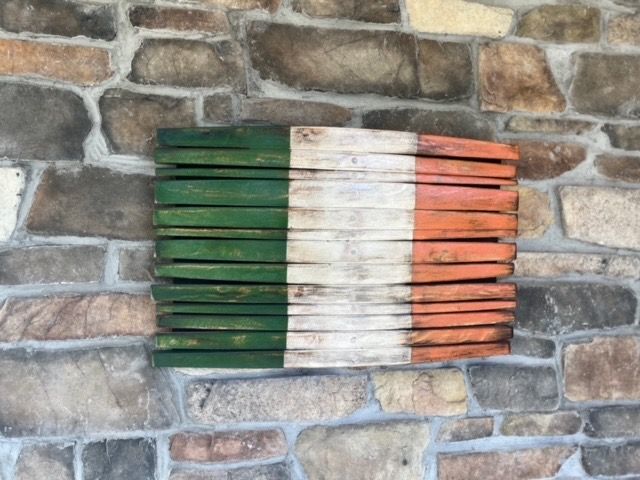Gerard Damien Quinn, known to the world as Jake, is one of the famed Quinns of Brooklyn, a family of 13: ten brothers and three sisters. To those who would consider the number 13 perhaps a bit ominous, the Quinn clan puts such superstitious notions to rest. In addition to representatives of the long blue line, Jake, a recently retired detective with a comprehensive career with the NYPD, and his brother Terry, a well-known technical adviser in films and former firefighter with the FDNY, the Quinn family's story is one of success in such fields as medicine and finance.
Jake Quinn is the sixth of the 13 siblings. Like many middle children in such a crowd, he is most often soft-spoken, studied, appraising, and always very smart. These qualities served him quite well in his career, one which began with the then-Housing Police in the projects of the Lower East Side and East Harlem of Manhattan. Quinn's career then took a trajectory that gave him a perspective on the various aspects of New York's urban milieu, that few, even on the job, attain. Quinn patrolled Crown Heights and Coney Island in Brooklyn, returned to Manhattan assigned to the Warrant Squad, specializing in early morning stakeouts and manhunts for fugitives from the courts, and then bounced back to Brooklyn. There, he played his part in the era of reclaiming the streets from crack-fueled violence with Brooklyn South Narcotics, where he earned his detective's gold shield. Afterwards, he served close to ten years with the prestigious group of detectives known as the Manhattan District Attorney's Squad.
Quinn grew up with his family in Flatbush, Brooklyn. His father, Edward, was a claims adjuster, and his mother, Maureen, née Kelly, minded the home and the large brood. His grandmother, Beatrice Regan Quinn, a native of Roscommon, lived upstairs and instilled in Quinn a love of all things Irish. She would regale the brood with tales of Ireland, and speak of music and culture. Her husband, Quinn's grandfather, Raymond Charles Quinn also served with the NYPD.
Religion was deeply ingrained in the family. Mass was mandatory on Sundays, Holy Days of Obligation, any days off and every morning of summer vacation. Grace was said before each meal, and on weekends a decade of the rosary. (The slightest groan would lead to the Sorrowful Mysteries). Quinn's love of Irish music and culture exemplified itself in many ways, including playing the drums for the Housing Police Pipe Band. But perhaps the most telling aspect of Quinn's Irish identity is his literary bent. A writer himself, Quinn since his youth has been enamored of Irish and Irish-American scribes. Among his favorite Irish authors are Frank O'Connor, William Trevor, and Sean O'Faolain. His American favorites include Flannery O'Connor and J.F. Powers. Quinn has pursued his own writing, working on a number of projects in his post-NYPD career. He also works with four of his brothers in equities trading. He and his wife, Liz, née Conklin, have four children, two of whom are young adults also pursuing careers of service, one a paralegal in the NY DA's Office, and another studying nursing. Their two younger children are in high school and elementary school. Quinn and his wife started dating at the tender age of 18, and in his own words, "still are."
By the way, if there should be any who are still leery of the number 13 as unlucky it certainly isn't when it comes to the Quinns. Consider this: When Grandmother Beatrice Regan was merely eight years of age, she emigrated with a chaperone from Ireland aboard one of the majestic ocean liners of her era. Arriving safely in New York harbor, the ship returned across the Atlantic, never to make home port. A tragic story, that of the Lusitania, but lucky for the Quinns that granny had a one-way passage.
What would you consider the best aspect of growing up in such a large family? Do you think there is any downside?
In answer to both questions: You're never alone.
Does your family still gather frequently?
Thankfully my parents are still with us and we gather on Sundays and holidays. The backyard barbecues were legendary in Brooklyn. There aren't many families as large as ours anymore. My clan has an eight brother to four sister ratio, which my sisters accept as a natural equation indicating it takes two men to equal one woman.
How do your three sisters relate to so many brothers?
It was hard for them; they were expected, in a sense, to be better than the boys. The house was small, and growing up they seemed sequestered, more emotionally then physically. They ate meals with us, but my parents wanted them to be ladies -- it was an uphill battle. I don't think they wanted the girls to take the lead from their brothers. I believe the three knew in the house they were special, appreciated it, and are close to my parents to this day because of it.
How did Gerard Damien Quinn get the nickname Jake?
Good question. I don't really know. My father gave it to me, and I liked it better than the names my brothers gave to me which I can't share with you in a family paper.
Working cases in the District Attorney's Squad must have taken you to some interesting places. Any particular cases or destinations come to mind?
I was given the opportunity to travel all over the United States (major cities and small towns). Alaska was absolutely the most breathtakingly beautiful place I'd ever been.
What was your favorite or most exciting assignment on the job? Have you begun to miss it?
Exciting is a euphemism for scary, and there were plenty of them on patrol, and Warrants and Narcotics. As far as missing it... I recently read Eddie Conlon's new novel "Red on Red," and when he describes even the small things, like going to the diner together and sharing a meal, the verbal teasing, the genuine characters you worked with in unique situations. All I can say, is I have a mental rolodex of memories that will keep me reflecting and laughing for the rest of my life.
What type of writing do you engage in? Do you feel that the need to express yourself through writing is a function of an Irish identity, or coming from a large family, or a combination of factors?
The stories I write usually have a police backdrop to them, only because that's what I know, and because let's face it, police do an interesting job. They are more character driven because police stories tend to be dramatic and you're able to put your characters at the most vulnerable points of their lives. It is a job rich in stories. Writing as expression definitely encompasses all of your life experiences. However, from the time we Irish sat around a hearth, we have expressed ourselves through the word, both written and verbal. We have an innate skill and love of story, and it seems at times, when telling it, it isn't just a desire but a nessessity.











